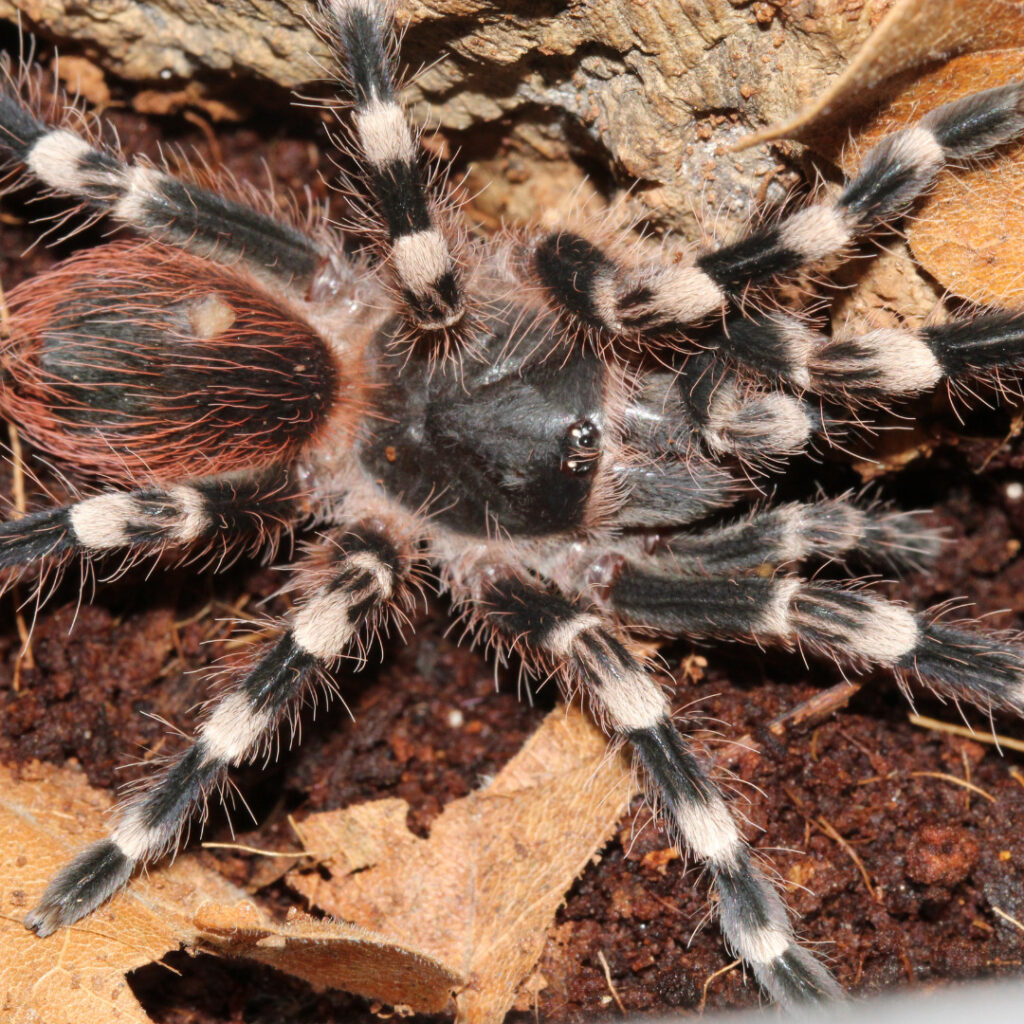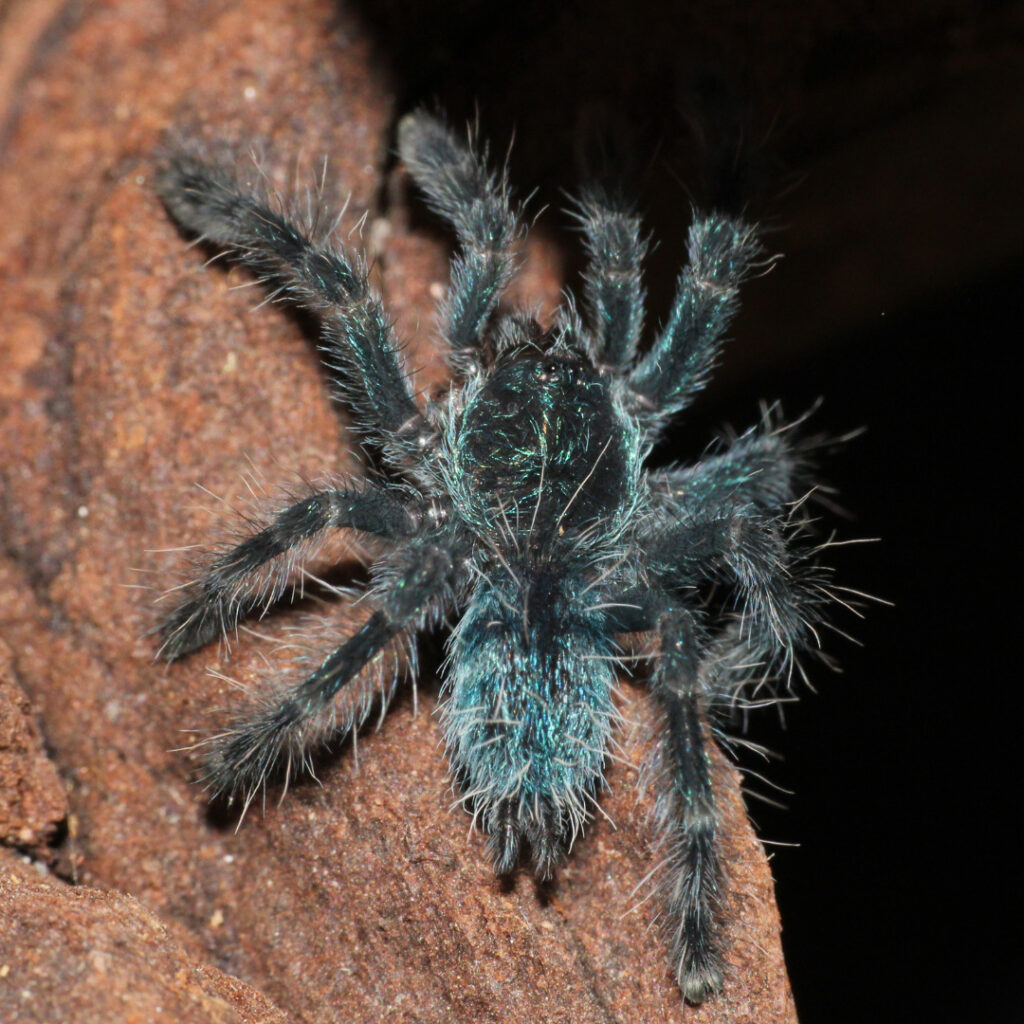
Tarantula care guide
Welcome to Evolution Reptiles’ guide to tarantula care! Whether you’re a seasoned arachnid enthusiast or just starting your journey into the fascinating world of these

Keeping tarantulas as pets has gained popularity among arachnid enthusiasts worldwide. These unique creatures offer an intriguing glimpse into the world of invertebrates. However, like any pet-keeping hobby, tarantula keeping has its pros and cons. In this blog, we will explore the advantages and disadvantages of tarantula keeping to help you make an informed decision about entering this captivating hobby.

1. Low Maintenance: Tarantulas are relatively low-maintenance pets compared to many other animals. They require minimal space, don’t need daily feeding, and don’t require walks or exercise. Once their enclosure is set up correctly, their care routine mainly involves regular feeding and maintaining suitable environmental conditions.
2. Unique and Beautiful Creatures: Tarantulas exhibit a wide range of stunning colors, patterns, and sizes, making them visually captivating pets. From the vibrant hues of the Mexican Red Knee to the elegant form of the Brazilian Black, tarantulas offer a diverse array of aesthetic appeal.
3. Educational and Fascinating: Tarantulas provide an excellent opportunity for education and learning about the natural world. Observing their behavior, molting process, and hunting techniques can be both fascinating and educational, offering insights into the intricacies of the arachnid world.
4. Quiet and Low-Impact: Tarantulas are silent creatures, making them suitable for apartment living or for those who prefer quieter pets. They don’t create noise disturbances and have minimal impact on their surroundings.
5. Long Lifespan: Many tarantula species have relatively long lifespans, with some living up to 20 years or more. This extended lifespan allows keepers to develop long-lasting bonds and observe their tarantulas as they grow and mature over time.

1. Fear and Misconceptions: The fear and phobia associated with spiders may deter some individuals from considering tarantula keeping. It’s crucial to address any personal discomfort or anxieties before embarking on this hobby.
2. Limited Interaction: Tarantulas are not pets that enjoy being handled or seek human interaction. They are primarily observation pets, and their delicate nature makes handling risky both for the owner and the tarantula itself. If you’re seeking a pet with whom you can engage in frequent physical interaction, a tarantula may not be the best choice.
3. Allergies and Sensitivities: Some individuals may have allergies or sensitivities to tarantula hairs. Tarantulas have specialized hairs called urticating hairs, which they use for defense. These hairs can cause irritation or allergic reactions in susceptible individuals.
4. Long Lifespan: While the long lifespan of tarantulas is a benefit for many, it can also be a drawback for some keepers. Committing to care for a pet with such a lengthy lifespan requires long-term dedication and planning for potential future circumstances.

Tarantula keeping offers a unique and captivating experience for arachnid enthusiasts. With their stunning beauty, low maintenance requirements, and educational value, tarantulas can be rewarding pets for those who appreciate these remarkable creatures. However, it’s essential to consider the cons, such as limited interaction, potential allergies, and personal comfort levels with spiders.
Before deciding to keep a tarantula, research and education are paramount. Visit our shop to see our large selection of tarantulas and learn about specific species, care requirements. Read our care guides (click here) and take time to understand your own comfort levels with spiders and assess if tarantulas.

Welcome to Evolution Reptiles’ guide to tarantula care! Whether you’re a seasoned arachnid enthusiast or just starting your journey into the fascinating world of these

How to Care for Your Reptile During a Power Cut Power cuts can be stressful, especially when you have a reptile that relies on a

Buying a Pet from Evolution Reptiles: the process Buying a new pet of any kind can be an exciting experience, getting everything ready for it,
Copyright 2021 Evolution Reptiles
All rights reserved.